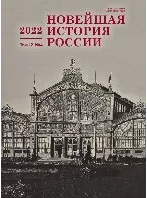Верующие колхозники и «попы-коммунисты»: к вопросу о сосуществовании православной и «социалистической» культур в жизни советского села позднесталинского и хрущевского периодов
Faithful Collective Farmers and “Communist Priests”: Coexistence of Orthodox and “Socialist” Cultures in the Life of the Soviet Village in the Late Stalin and Khrushchev Periods
Author(s): A. V. ApanasenokSubject(s): Cultural history, History of Church(es), National Economy, Agriculture, Diplomatic history, Post-War period (1950 - 1989), Eastern Orthodoxy, Sociology of Religion
Published by: Издательство Исторического факультета СПбГУ
Keywords: Soviet Union; religion; peasantry; Orthodoxy; confessional practices; socialism; culture;
Summary/Abstract: The paper is devoted to the problem of the existence of Orthodox traditions in the life of Soviet collective farms during post-war decades. Its main goal is to find out how the traditional confessional culture of the village has adapted to the realities of “developed socialism”. Considering the Orthodox practices of Soviet peasants in the late Stalin and Khrushchev periods, the author departs from the traditionally rigid opposition of the concepts of “Soviet” and “religious”, starting from the thesis about the possibility of mutual influence of the corresponding cultures and their practical coordination at the level of everyday life. The research source base was made up of materials from the central and regional offices of the Council for the Affairs of the Russian Orthodox Church under the Council of Ministers of the USSR, as well as documents of party structures that actively discussed the problems of mass religiosity during the Khrushchev period. Based on them, the paper discusses the depth of penetration of Soviet ideology into village life, the manifestations of the post-war Orthodox revival, the attitude of local party cadres to it and specific ways of adapting “village Orthodoxy” to official Soviet discourses. The paper concludes that traditional Orthodox practices were filled with additional meanings corresponding to the values of patriotism, socialist construction, and the struggle for peace officially declared by the Soviet state. In addition, the appearance of a new type of “Soviet priest” in the village is demonstrated — a priest who shares communist values with the exception of atheism and broadcasts them to his parishioners. Finally, the paper shows examples of practical coordination by peasants of elements of Orthodox and new “socialist” culture both at the level of worldview and in everyday life.
Journal: Новейшая история России
- Issue Year: 12/2022
- Issue No: 41
- Page Range: 1018-1034
- Page Count: 17
- Language: Russian

